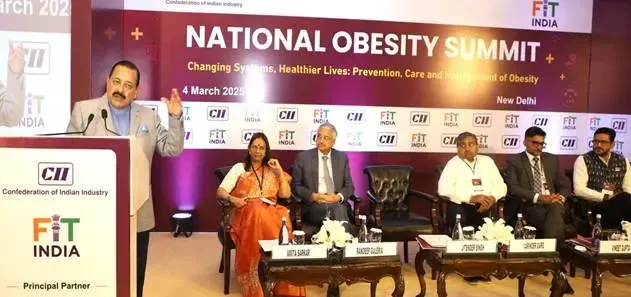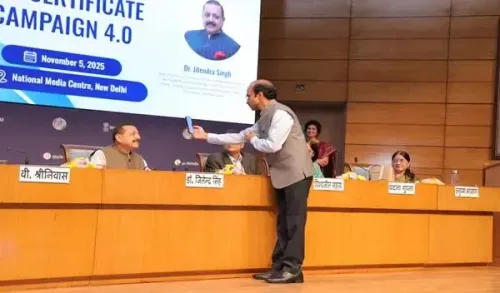Addressing Obesity: A Collective National Duty, Says Jitendra Singh

Synopsis
Key Takeaways
- Obesity is a national concern that requires unified efforts.
- India ranks second globally in childhood obesity.
- Central obesity significantly raises health risks.
- Economic burden of obesity affects families.
- Public-private partnerships are essential for effective screening.
New Delhi, March 5 (NationPress): Addressing the escalating issue of obesity, which leads to numerous health complications, is more than an individual concern; it is a national obligation, stated Union Minister of State for Science and Technology Jitendra Singh.
Speaking at the 'National Obesity Summit', hosted by the Confederation of Indian Industry (CII) in conjunction with 'World Obesity Day', the Minister highlighted that obesity transcends being a mere lifestyle choice; it represents a significant public health crisis that necessitates unified efforts from the government, industry, healthcare professionals, and society at large.
"Obesity is a multifactorial challenge and requires multifaceted preventive approaches," noted Singh, who is also a Professor of Medicine and a respected Diabetologist.
He further stated, "Obesity is not solely an individual issue; it is a national concern. As we envision India in 2047, we must ensure that our youth remain healthy, productive, and free from preventable lifestyle diseases."
India holds the second position worldwide in childhood obesity, with more than 1.4 crore children affected.
"We often take pride in having plump babies, but this comes with risks. Central obesity, especially among Indians, poses an independent and serious health hazard," he elaborated, detailing how obesity is a key contributor to non-communicable diseases like type-2 diabetes, cardiovascular ailments, and fatty liver disease.
The Union Minister acknowledged the unique susceptibility of the Indian phenotype to central obesity, referencing studies that indicate even seemingly lean Indians possess a higher percentage of visceral fat compared to their Western peers. Singh also voiced concerns over the increasing rates of obesity, despite prevalent awareness campaigns and medical advancements.
"While we advocate for fitness and wellness, obesity rates are still climbing. This contradiction must be tackled with scientific precision and societal dedication," he stressed.
The Minister highlighted the economic strain obesity imposes on families, with many individuals grappling to afford ongoing treatment for metabolic disorders. He underscored the necessity for a strategic response and urged a collaboration between industry and government to create affordable, universal screening models for obesity and metabolic diseases.
"This battle cannot rest solely on the shoulders of diabetologists or obesity specialists. It demands a national pledge involving policymakers, medical professionals, and industry leaders," he asserted.
He proposed a public-private partnership where routine health assessments incorporate obesity markers, particularly in hospital environments, to enable early diagnosis and intervention.
Importantly, the Minister warned against new quick-fix solutions, such as weight-loss injections and fad diets, reiterating the significance of sustainable lifestyle changes.
"The genuine solution lies in self-discipline—understanding our bodies, managing our diets, and adopting a balanced health approach," he concluded.









